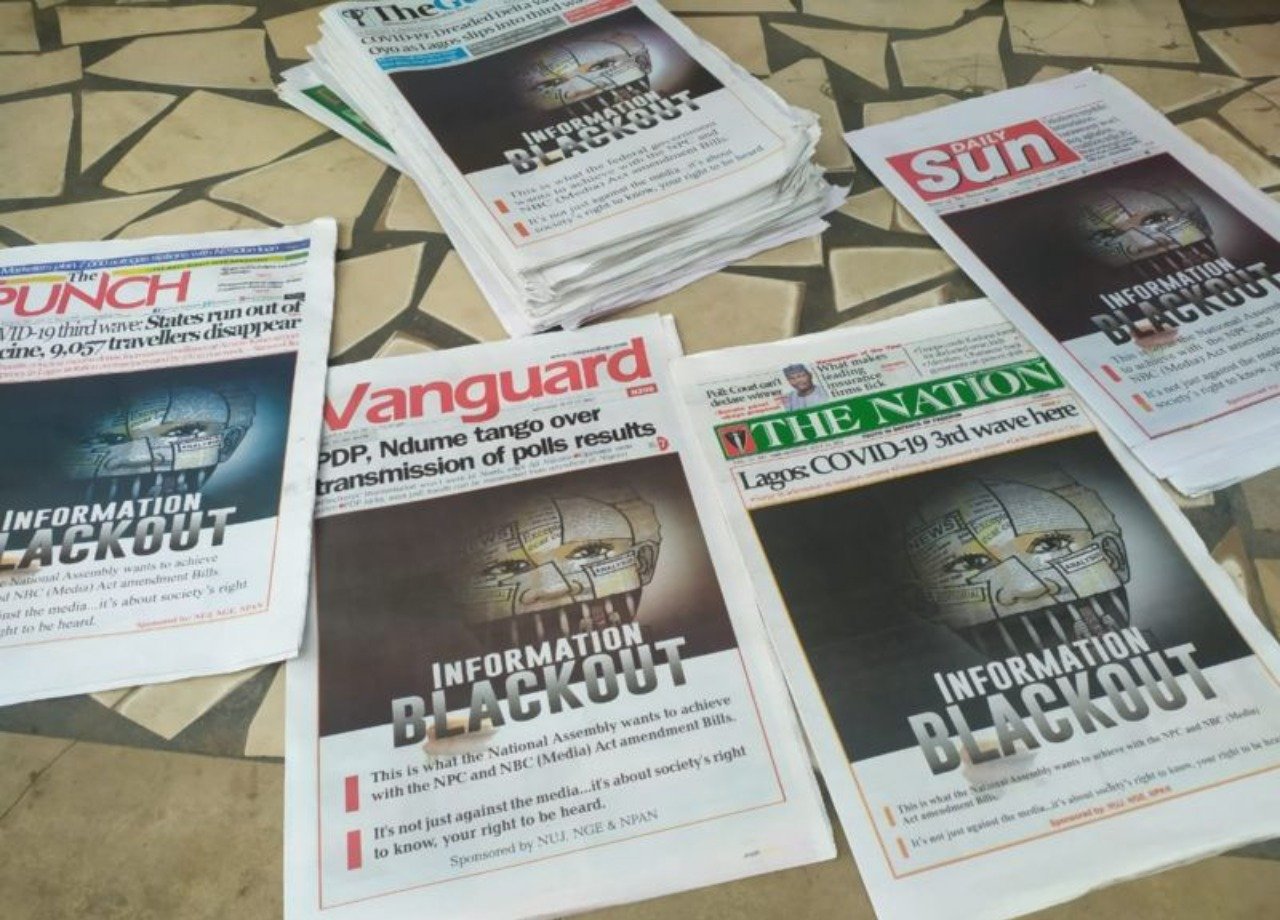No To Anti-Media Bills

The 1999 Nigerian Constitution (as amended) guarantees freedom of the press and freedom of expression. Section 22 of the Constitution expressly states that “the press, radio, television and other agencies of mass media shall at all times be free to uphold the fundamental objectives contained in this chapter and uphold the responsibility and accountability of the government to the people.”
Section 39(2) of the Constitution also states: “Without prejudice to the generality of Subsection (1) of this section, every person shall be entitled to own, establish and operate any medium for the dissemination of information, ideas, and opinions.”
Essentially, this means that the press should be free to do its duty of holding government accountable to the people without inhibitions.
Press freedom will, therefore, be undermined if the current bills to amend the Nigerian Press Council Act and the Nigerian Broadcasting Commission (NBC) Act currently before the National Assembly are passed into law. The toxic media bills seek to criminalise journalism business and practice despite legion of laws in the country with enough provisions and avenues for legal redress whenever the press errs.
The obnoxious bills also seek to give regulatory bodies judicial powers and by so doing usurp the powers of the courts. The bills, if passed into law, intend to regulate the print media and related media houses, impose sanctions on perceived areas of infringement, including fines and terms of imprisonment against journalists and media houses.
There are also fears that the government is using the NPC and NBC Act amendment bills to continue the assaults on the media as it has done with the Cybercrimes Act. Sections 24 and 38 of the Act have been used in many instances to clampdown on bloggers or journalists for expressing opposing political opinions. It is on record that Amnesty International has documented 50 cases where the law had targeted not cybercrime suspects, but bloggers and journalists.
Exposed!! Popular Abuja doctor revealed how men can naturally and permanently cure poor erection, quick ejaculation, small and shameful manhood without side effects. Even if you are hypertensive or diabetic . Stop the use of hard drugs for sex!! It kills!
We believe that the bills smirk of an attempt to unduly suffocate the operations of the media business in total disregard of the provisions of the Company and Allied Matters Act. Apart from being unconstitutional, the proposed bills run against the principle and tenets of the rule of law.
It is commendable that the Newspaper Proprietors’ Association of Nigeria (NPAN), the Nigerian Guild of Editors (NGE) and the Nigeria Union of Journalists (NUJ) have called on the National Assembly to step down the unpopular bills. It is worth reminding the promoters of the said anti-media bills that they are sub judice, in view of a pending case on the subject now before the Supreme Court by the Nigerian Press Council (NPO). Moreover, allowing debate on the bills violates the rule of the National Assembly which forbids deliberation on any matter before the court.
We strongly believe that the bills lack any redeeming feature of good laws, considering that they are discriminatory and offensive to public good and morality. Besides, the media has the capacity for self-regulation and has actually been doing so without prompting. The media is totally against government regulation that impedes its independence, that is punitive and erodes the constitutional provisions on press freedom.
We consider penalties for offences as stipulated in the proposed amendment, including a fine of N5 million or three years imprisonment, as punitive and may threaten media independence and freedom. Section 33 (3) (4) of the proposed amendment, which does not give room for retraction or apology where fake news is mistakenly published but recommends a blanket sanction of up to N10 million or closure for a period of one year or both, is draconian. Also, the provision that a journalist could be held liable for the offence committed by his or her organisation and can be made to pay a fine of N250,000, is punitive.
For the protection of public interest, we think that any media regulator worth its name must be independent of the political control and manipulation of the government of the day so that it can fairly adjudicate in all cases before it as obtains in Ghana, South Africa and others.
Considering the deluge of anti-media bills and laws made by the legislature since independence, it has become imperative to have a constitutional provision which will shield the press from the incessant anti-media laws by successive governments and the National Assembly, as obtainable in the United States (US) and Ghana, where the constitution clearly stated that no law shall be made to impede freedom of the press.
In the US, Amendment 1 (First Amendment) states: “Congress shall make no law respecting an establishment of religion, or prohibiting the free exercise thereof; or abridging the freedom of speech, or of the press; or the right of the people peaceably to assemble, and to petition the government for a redress of grievances.” In the case of Ghana, a neighbouring West African country, Clause one of Article 162 of its 1992 Constitution states explicitly that, “freedom and independence of the media are hereby guaranteed.”
Clause two of the Ghanaian constitution states: “Subject to this constitution and any other law not inconsistent with this constitution there shall be no censorship in Ghana,” while clause three provides: “There shall be no impediments to the establishment of private press or media; and in particular, there shall be no law requiring any person to obtain a licence as a prerequisite to the establishment or operation of a newspaper, journal or other media for mass communication or information.”
The fourth clause of the aforementioned law says “editors and publishers of newspapers and other institutions of the mass media shall not be subject to control or interference by government, nor shall they be penalised or harassed for their editorial opinions and views or the content of their publications,” while the fifth clause provides that “all agencies of the media shall, at all times be free to uphold the principles, provisions and objectives of this constitution, and shall uphold the responsibility and accountability of the government to the people of Ghana.”
The sixth clause of the Ghanaian constitution states that “any medium for the dissemination of information to the public shall be obliged to publish a rejoinder, if any, from the person in respect of whom the publication was made.”
No doubt, Ghana’s constitution has largely safeguarded the freedom and independence of the press. That is what Nigeria needs, not anti-democratic legislation that attempts to gag the press and stifles its operation. The anti-media bills to amend the NPC Act and the NBC Act are therefore totally against media freedom. They must be discarded by the federal lawmakers forthwith. Any attempt to gag the press through these bills will eventually obliterate the people’s right to freedom of information. It will also rob the lawmakers in particular and Nigerians in general the freedom to express themselves.




